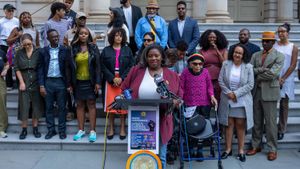Political upheaval continues to besiege Bangladesh as the youth-driven movement against former Prime Minister Sheikh Hasina ends with her ousting. The transition to interim governance under Nobel Laureate Muhammad Yunus, appointed following the tumultuous protests and clashes, brings hope to some but concern to many. Amid this storm of change, the new government faces pressing challenges including establishing stability, curbing corruption, and restoring public trust.
With the nation still reeling from the violence and the significant loss of life—a reported over 600 casualties during the protests—the stakes could not be higher. The International Crisis Group (ICG) recently laid out recommendations for the Yunus administration, emphasizing the need for quick wins to secure public support. They advised tackling petty corruption, improving public services like electricity supply, and managing the soaring prices of commodities.
Emphasizing the urgency, the ICG's report underscored the need for the interim government to act decisively to avoid reverting to the deeply unpopular governance style of the former regime. Haiyan Xu, ICG’s representative, cautioned against allowing unchecked return of influence to the Bangladesh Nationalist Party, which could lead to another autocratic regime or worse—military intervention. “The danger of slipping back is very real,” Xu noted. “History must not repeat itself.”
Yunus, who previously garnered international acclaim for his innovative microfinance practices, finds himself at the helm of potentially the most critically transformative government Bangladesh has seen. The report by the ICG highlighted the importance of this transitional phase, stressing the opportunity it presents for genuine governance reforms. It pointed to the necessity of political consensus among key players, including student leaders and Islamist groups.
Adding yet another layer of complexity to the situation, the World Bank's commitment to supporting the new government has sparked discussions on aid and international relations. There is renewed hope for reform-oriented policies, aimed not just at governance but also economic enhancement, seen as pivotal for sustainable growth.
Along with governmental change, incidents of communal discord have marred the fabric of civil society. A recent clash between the indigenous Hindu community and law enforcement forces raised alarms about the potential for religious tensions to erupt. The leader of Hefazat-e-Islam, Azizul Hoque Islamabadi, attempted to quell fears by stating the organization does not oppose Hindus and called for peace between communities. His remarks followed violence attributed to members of ISKCON, who were accused of instigatory actions against Muslims, resulting in significant unrest and arrests.
While these events highlight the challenges posed by communal relations during this delicate political climate, Islamabadi emphasized the intertwining of the various religious groups within Bangladesh. “For 150 years, we have coexisted with Hindus. We want to preserve this harmony,” he stated, underscoring Hefazat-e-Islam's commitment to safeguarding the rights of all religious communities.
Meanwhile, Yunus faces the task of forging stable governance quickly so the public retains confidence. The interim government will need to show results, as failure to do so may lead to renewed civil unrest or worse. The ICG's report revealed the formidable scale of the task at hand: balancing political consensus, economic stability, and practical governance.
Experts from various sectors have echoed calls for external support, stating the international community, particularly India, must repair its image post-Hasina, recognizing the deepening public resentment. Yunus’ administration is at the crossroads of potentially redefining the political narrative of Bangladesh. The global stage is watching closely, with many hoping the new government can navigate these choppy waters and usher the country toward stability and reform.
While the shadows of the past hang over the present, the hope for reform remains alive among the people. With protests demanding change paving the initial way to Yunus’ government, citizens are eager to see if the new regime will truly meet their aspirations. The coming days will prove pivotal, as they hold the potential for either disruption or the long-sought harmony and progress Bangladesh so desperately craves.
With every action taken, from the interim administration's policies to community leaders’ tones, the political merge happening within Bangladesh could set the course for future governance—whether progressive or regressive, it's the next chapters of this nation’s story where hope, politics, and community resilience intertwine.



